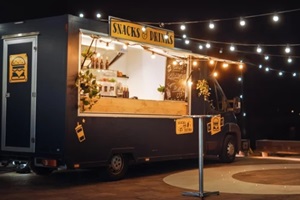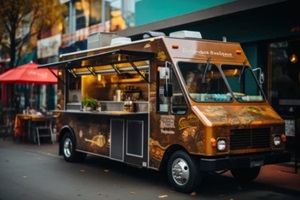 Food trucks have become a major success in recent years, especially in Hawaiʻi where temperatures are warm year-round. Mouthwatering cuisine available in mere minutes draws in crowds, while the minimal overhead costs keep expenses manageable.
Food trucks have become a major success in recent years, especially in Hawaiʻi where temperatures are warm year-round. Mouthwatering cuisine available in mere minutes draws in crowds, while the minimal overhead costs keep expenses manageable.
It’s no surprise that the food truck market jumped from $3.73 billion in 2023 to $4.04 billion in 2024, with an 8.3% CAGR. Of course, there are several financial considerations when operating a food truck, such as small business insurance. Some policies are a requirement and some are just good business sense.
Here’s what you need to know to be prepared for whatever unexpected event may come your way with the right insurance in Hawaiʻi.
What Is Food Truck Insurance and Who Needs It?
Food truck insurance is a customizable form of business insurance used to protect against risks that often accompany food truck operations. In Hawaiʻi, state laws require businesses to carry two types of business insurance when applicable: commercial auto insurance and workers’ compensation insurance.
With guidance from an experienced insurance agent, food truck operators can create a personalized insurance package that includes policies that meet their individual coverage needs and budget.
Many types of businesses benefit from carrying food truck insurance, including:
- Concession trucks
- Lunch trucks
- Catering trucks
- Vending trucks
- Mobile food trucks
- Ice cream trucks
Nearly every type of food truck should also have business insurance to protect against accidents, lost income, lawsuits, equipment breakdowns, and similar problems. Let’s break down the “must haves” and the “should haves” of insurance for food trucks.
What Types of Business Insurance Do Food Trucks Need?
An exhaustive food truck insurance package contains multiple types of business insurance to cover a variety of problems you may encounter. However, all food trucks must include commercial auto and worker’s compensation, and should include general liability insurance.
Commercial Auto Insurance
In Hawaiʻi, commercial auto insurance isn’t just recommended but is required. All business-owned vehicles must be covered by commercial auto insurance, which covers the cost of work-related accidents. Hawaiʻi also sets minimum auto liability insurance requirements. These include:
- $10,000/person for personal injury protection
- $10,000/occurrence for property damage liability
- $20,000/person for bodily injury liability
- $40,000/accident for bodily injury liability
Auto insurance is a must for all food trucks to protect both the vehicle itself and any permanently attached equipment and appliances. There are several components of commercial auto insurance, with one of the most important being physical damage coverage.
This form of coverage protects the business against financial losses from vehicle theft, vandalism, and damage caused by weather events.
Worker’s Compensation Insurance
 Workers’ compensation insurance is legally required for all Hawaiʻi businesses that have employees, part-time or full-time. The Hawaiʻi Revised Statues §378-61 defines an employee as a “person who performs a service for wages or other remuneration under a contract for hire, written or oral, express or implied.”
Workers’ compensation insurance is legally required for all Hawaiʻi businesses that have employees, part-time or full-time. The Hawaiʻi Revised Statues §378-61 defines an employee as a “person who performs a service for wages or other remuneration under a contract for hire, written or oral, express or implied.”
This coverage provides financial compensation for medical care and/or cash benefits for employees who become ill or injured as a direct result of their job. It also covers the lost wages of the employee. Businesses that fail to carry workers’ compensation coverage could face penalties.
General Liability Insurance
As a food truck operator, your main objective is to serve customers tasty food quickly without sacrificing quality or customer service. No matter how careful your crew is when preparing, cooking, and serving food, mishaps can occur.
Accidentally adding an expired ingredient to a dish or serving a customer a coffee that’s too hot could leave you legally liable for damages.
A general liability insurance (GLI) policy protects food truck businesses against events for which the business may be held liable, such as property damage, customer injuries, and advertising injuries.
These policies generally cover medical expenses, costs for property damage, administrative costs, and expenses related to judgments, settlements, and court costs.
Businesses that operate multiple food trucks will generally require additional coverage to satisfy legal requirements. If you park your food truck at various pre-arranged locations for mobile sales, this policy may be a requirement of the establishment owner.
What Other Policies Should Food Truck Businesses Have?
While GLI and commercial auto insurance are among the most important policies to have as a food truck operator, there are other coverage options to consider. These include:
1. Equipment Breakdown Insurance
Equipment breakdown coverage can help cover repair or replacement costs for malfunctioning or damaged equipment after a covered incident. In a food truck, equipment could range from refrigerators and grills to food warmers and payment processing systems.
2. Business Owners Policy (BOP)
BOPs provide food truck operators with an easy and budget-friendly way to protect their business by bundling three essential coverages:
- Business Liability Insurance: Covers property damage and bodily injuries that a business may accidentally cause to others.
 Commercial Property Insurance: Covers a business’s physical location and business equipment that is damaged due to a covered peril.
Commercial Property Insurance: Covers a business’s physical location and business equipment that is damaged due to a covered peril.- Business Interruption Insurance: Replaces lost income if the business is temporarily forced to shut down due to a problem covered by the policy.
Some types of coverage are not part of a standard BOP, such as professional liability, employment practices liability, and flood and earthquake insurance. Be sure to confirm these with your insurance provider, and add them as riders if needed.
Protect Your Food Truck Business with Help from Atlas
No matter what type of food you serve up on wheels, having the right business insurance can keep you rolling. As a local leader of business insurance solutions, Atlas Insurance Agency has been helping clients in Hawaiʻi get the coverage they need for more than 100 years.
Contact us today to see how our team can help protect your food truck business.
